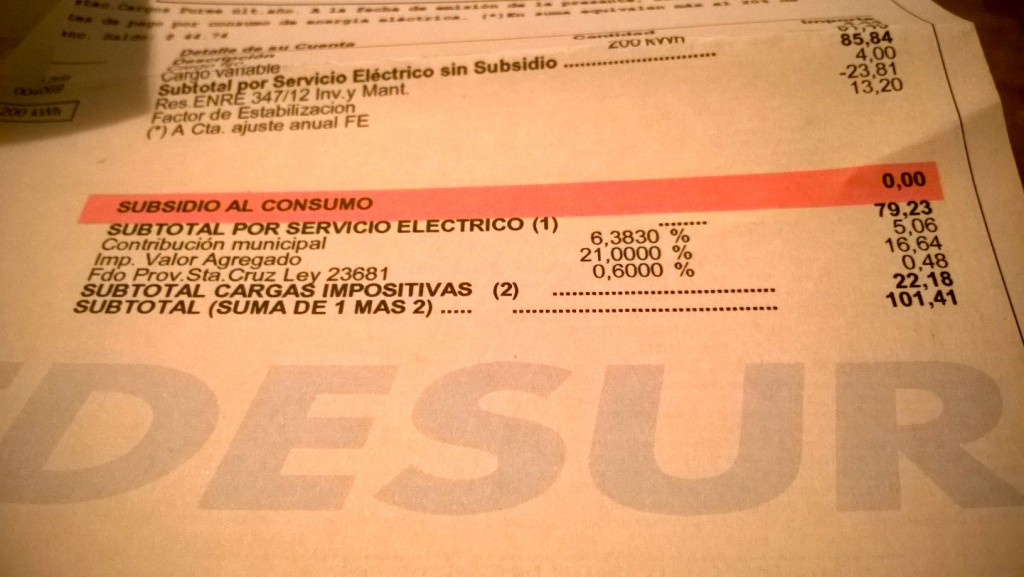EspañolAs of Tuesday, July 22, the Argentinean government has spent 97 percent of its total budget for energy subsidies in 2014. It has used AR$40 billion (US$3.2 billion) of its AR$42 billion (US$3.4 billion) budget, and authorized an additional AR$7 billion (US$562 million) three weeks ago through the Formulation and Execution of Electric Energy Policy program.
Despite the subsidies and 14 years of frozen rates, energy distributors are still losing millions of pesos every day.
Buenos Aires newspaper La Nación reports that the government should have spent nearly 60 percent of its budget by this point in the year, based on budget planning data released by the Ministry of Economy. At the current rate, however, the government is on pace to far exceed 100 percent of its budget, according to Jorge Lapeña, former secretary of Energy and president of the Argentine Institute of Energy.
Daniel Montamat, an energy consultant and former president of the now state-owned Yacimientos Petroliferos Fiscales (YPF) oil company, notes that for as long as the subsidy policy continues, the government’s deficits will continue to grow and will need to increase its money supply to fund it.
“This scenario means more inflation and currency troubles, unless Argentina accesses the international debt market. It will be a complicated legacy for the next administration to inherit,” said Montamat.
Taking the budgetary forecast into account, the Ministry of Planning expanding the budget through an administration resolution signed by the Argentinean minister of Economy and chief of staff. An additional AR$7 billion was approved and allocated primarily to the energy distributor Wholesale Electricity Market Administration Company (CAMMESA).
The Budget and Financial Public Administration Association of Argentina (ASAP) focused most of the energy subsidy money into two companies: CAMMESA and the Argentina Energy Company (ENARSA).
These companies are responsible for receiving and managing the resources provided by the federal government and for importing gas to supply the local market.
Axel Kiciloff, minister of Economy, justified the new energy subsides last February by saying: “What we are implementing is a policy of growth and income distribution, because there are huge disparities throughout the country.”
Iván Cachanosky, an analyst for Argentinean think tank Liberty and Progress, was not surprised by this news.
“According to the last subsidies report released in April by the ASAP, the budget had already reached 48 percent for the entire energy sector. CAMMESA, the most subsidized company, spent 65 percent of its budget in the first four months of the year, so it is not surprising that now, in July, most of the budget has been used despite the government’s efforts.”

An ASAP report shows that the total spent in subsidies in 2013, including social programs, transportation, energy, and others, amounted to AR$134 billion (US$10.3 billion).
What Happens Next?
According to Cachanosky, the government could decide to increase its subsidies budget by increasing its money supply, thereby worsening an inflation rate that could reach 44 percent this year.
“On the other hand, the government could choose to decrease subsidies a bit more, but this would be politically inconvenient for the ruling party, given their rhetoric. Of course, the idea is to gradually increase prices that today are artificially low, make it profitable again, attract investments, and avoid expensive imports,” explains Cachanosky.
Dora Iavoka, head of regional studies in the Southern Hemisphere Department of the International Monetary Fund, suggested energy subsides be cut last May because they are “very costly and distort economic activity.”
 Versión Español
Versión Español












